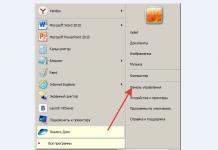Most Russian Internet users probably have probably heard of recent legislative initiatives on the "regulation" of the Internet, or rather, about the desire of the authorities to prohibit VPN and anonymizers, allowing to bypass the state censorship. Continuing the topic of anonymity and security on the Internet, we will tell you how you can bypass the prohibitions prohibiting circling prohibitions.
Who and that prohibits
A few words about the prohibitions and the fact that they are once again trying to ban.
Legal responsibility
Of course, many are tormented by the question - is it legal to use Tor Browser in Russia after November 1, 2017? Theoretically - yes, because the law does not prohibit be anonymous, and the browser itself is not in itself a means of providing access to resources prohibited in the Russian Federation for third parties. And most likely it will be, in any case, in the near future.
But still, we will try to assume the worst option - let's say, you interfere with "influential people", and they are just looking for a reason for what to punish you. In this case, it can be assumed that the TOR-network retranster launched Tor -Browser can be interpreted as a program involved in providing access to resources prohibited in Russia besides you. If all this can somehow be paid to court, including a 30-day warning period and proof that you are a search engine operator, then everything that threatens to a physical face, this is an administrative penalty of 5,000 rubles.
The amount is noticeable, but not fatal at all, which further reduces the likelihood of such an application of the law against individual citizens using Torbrowser and other similar programs. For officials and legal entities, the amount is more impressive, but it does not interest us, details can be found in the relevant bill.
So, we found out that we still do not threaten anything terrible for using Tor Browser. Now let's figure out how you can bypass the ban, prohibiting to bypass the ban!
Tor banned. What does it look like?
The meaning of the entire connection system to Tor through the bridges is that the complete list of Tor IP addresses is not published anywhere, unlike conventional repeaters, whose list of RKN and others can get at any time. And since there is no list of IP addresses, it is not known that blocking, which means that the blocking itself is impossible. The above link allows you to get the addresses of bridges for no more than a few pieces at times, with manual filling of the Captcha form. And we hope that unlocked bridges will end later than the patience of civil servants engaged in their search. Of course, there are more technically sophisticated methods for finding all, or at least the majority, IP addresses of bridges, because the option of full blocking of bridges cannot be excluded.
Of course, there is a reasonable question here - how do we get to the page issuing bridges, if all Torproject.org is blocked in Russia? It turns out to run the blocked Tor we need to go to the locked resource. Anonymous Web proxy will help us to break this vicious circle. Drive in the search bar Anonymous Web Proxy (do not forget that in addition to Yandex and Google there are other search engines) and go through the obtained links.
Probably anonymous Web proxies will also try to block, and already blocked. But their number on the Internet is large enough, with a relatively low popularity of each separately. Because at a minimum in the near future we can count on their help.
For example, you can use these services:
They are for now Not blocked on the territory of the Russian Federation and do not require the use of Java Script for their correct work. If some of them does not work, then do not despair - check the next one.
Configure your own VPN server
If you plan to configure the VPN server yourself, then carefully read whether the tariff is supported by your hosting provider. The cheapest VPS. may not support such an opportunity
How to do it is written for example.
By running your own VPN server, you can not only use it yourself as a means of circumventing censorship, but also provide access to your friends and acquaintances, do not pay for it neither the cents over the already paid hosting provider Keep in mind that inexpensive VPS has a limit on traffic included in the tariff. But most likely it does not constrain you - usually 500 GB of traffic and more stands out for a month. .
You can connect to it from all common operating systems, including Windows, although, of course, we recommend using Linux.
Use SSH Tunling
A much simpler technically option, especially if you are using Linux. Briefly its essence is described, however, it is hardly a lot to explain to you if you do not have minimal knowledge in the IT area. Therefore, focus in practice.
Pay attention to the following points used in the examples:
You need to replace the IP address that you get from the VPS provider. - root - the username for connecting to the VPS, most often it is. You can clarify it in the VPS administration pane.
- While entering the password, you will not see the displays of the password and any other characters, everything will look like you are not gaining anything - it is done so that no one can spit your password. Just enter the password and press ENTER.
Running tunnel under Linux
Open the terminal window (Linux command line) and enter the command:
sSH -VND 127.0.0.1:8080 [Email Protected]
- sSH - Directly command Running tunnel to your VPS.
- -VND 127.0.0.1:8080 - Keys and arguments of the launched command: include debug output and create a proxy tunnel from your computer to your VPS.
- [Email Protected]
- Username and IP address VPS.
After a set of this command and pressing Enter on the keyboard, you will see something like this:
~ $ ssh -vnd 127.0.0.1:8080 [Email Protected]
Row "Debug1: Entering Interactive Session." Indicates that the tunnel is running, you can fold the terminal window (without closing!) and proceed to configure the Tor Browser.
Starting the tunnel under Windows
First of all, you download and install Putty or any other SSH-client supporting tunling.
Run Putty and configure the session:

Setting the session in Putty
In the "Host Name (or IP address)" field, you enter the IP address of your VPS, below in the "Saved Session" section allocate "Default Settings" and click on the right "Save" button - now you do not need to enter the IP address each time.
In the left part of the window, select: Connection → SSH → Tunnels:

Configure SSH Tunnel in Putty
In "Source Port" write 8080, and click the Add button. Below you install points at the points "Dynamic" and "Auto".
Now click Open, in the black window that appears, enter the root login (or the one that issued a VPs -Produder), click on the Enter keypad, now enter the password (it is not visible), once again Enter on the keyboard. If everything is done correctly - you will start the session with the command line invitation. Fold (without closing!) This window and go to the Tor Browser setting.
Setting Tor Browser to work with tunnel
Start Tor Browser, open the Tor Network Settings window and follow the following steps there:

Do not use Internet censorship
Taxation tools, type of bridges or Meek-transports we are not needed now, because the connection to the TOR-network will be made by the VPS rented abroad.

Turn on the use of proxy to access
This setting allows you to organize a connection to TOR through a running tunnel.

Specify the Proxy Server Address
Here are the same as the address and port of the proxy server, the role of which is the SSH-Clement connected from your computer to overseas VPS.
If everything is done correctly, Tor Browser will successfully connect to the network.
Get bridge addresses via email
Remember the development of events.
Once it was possible to write on the Internet anything and anywhere. Then it turned out that it was not always the case, and you need to carefully choose places and expressions. Then it turned out that some themes should not speak at all, no in any way, and here the means of Internet anonymization were useful. After that, they began to fight with them, Russia is not the leader here - it only supports the global trend.
We are convinced that all this is done for our security, in the name of the struggle against terrorism and other terrifying ulcers of civilization. However, the situation is only worsening that it is not surprising - after all, instead of combating the causes of these phenomena, the leading global powers only aggravate them more and more hard exploitation of the third world countries. At the same time, successfully using the measures of "increased security" to combat dissent in their own boundaries.
It can be assumed that in the near future anonymity and privacy will be prohibited as such at the legislative level (China has already actually implemented). And access to the Internet will be carried out on "white lists" - i.e. According to the lists approved with the participation of state bodies, and everything that is not included in these lists will be prohibited by default.
The longer we are decided on a fair reorganization of society, the more difficult for us everything will be later, and the more losses will incur all of humanity.
The Russian has become a law enforcement of criminal case for reports of terrorist attacks. He says that just went into blocked sites through Tor
+
In October 2016, an electronic letter on a preparing terrorist attack came to the administration of one of the regional centers in Russia. In the report, received in the mayor's May 17 at 2:20 am, it was said about the allegedly preparing explosion in one of the shopping centers of the city. From the ruling of the local district court (the text of the document is at the disposal of "jellyfish") it follows that the threat of the explosion was qualified as a deliberately false report about the terrorist attack. On October 19, on the fact of this report, a criminal case was opened.
The investigation is engaged in the FSB. The ruling says: FSB staff found that the report on the preparing explosion was sent from IP 163.172.21.117 (according to the RIPE IP addresses database, the address is registered in Paris). The special services managed to find out that this IP is actually a "service to conceal and substitution address", that is, one of the active weekend nodes of the Tor network, which began to work in September 2016.
A personnel of a criminal case was a resident of the Russian city, who used the French weekend Tor night on the night of October 17. The FSB found that on October 17, from 1:30 to 3:00 to the IP address 163.172.21.117, a connection was made from the city in which a false report on the terrorist attack was recorded. The user who could do this was identified; In the case, he passes as a witness. Soon the FSB came out of the case, follows from judicial documents.
A criminal action person really uses Tor.
He himself said "Medusa" that he had several services at once to preserve anonymity, including Tor. According to him, he uses them to enter the sites blocked in Russia; Most often it is torrent trackers and sites about anime. The Figurant does not remember whether he used to Tor at night on October 17, "but insists that he did not send any messages about the terrorist attacks. He says that at the same time thousands of other Tor users could take advantage of the same weekend, one of them and could send a message about the terrorist attack.
During the search, the case person has seized all the technique.
He told "Medusza" that on December 29, 2016, around 19:00 came to him with the midst of police officers: "I was given a court order. Let's go into my room in things. Then they began to seal the technique. The rest of the rooms watched purely visually. As a result, we took all the equipment: two computers, all phones, all flash drives, even non-working film photographs. They wanted to pick up even the monitor, but then changed her mind. " On the same day, he was interrogated in the Ministry of Internal Affairs. "They asked if anonymizers were installed on the computer, for what purposes, which sites you go," he says.
He read a letter about the terrorist attack sent to the city administration, and asked if he wrote him. According to him, there was a "complete madness" in the letter. The figure is the case in a conversation with the "jellyfish" retold the content of the message so: "I'm on the way to your city. Soon everything takes off on the air, there will be only blood and pieces of meat around. "
Eight months after the search, the case was lying without movement.
The trigger of the criminal case says "Medusa", which since December 29 did not cause him for interrogations, and also did not report any results of the investigative actions. At the same time, he assumes that the police can change its status and translate from witnesses to the accused. "I am apolitical, I do not quit for [Alexey] Navalny's opposition. In general, in essence, no one. I have never even had administrative. I'm just a hack, constantly sit at home and I'm not supervised anywhere. I am an ideal goal without money and connections to breathe it on someone. I can not oppose them, "he emphasizes. In the Ministry of Internal Affairs of the Region on the progress of the investigation, they refused to speak with the "jellyfish".
On August 15, the employee of the criminal case himself came to the Ministry of Internal Affairs to the investigator in the case and inquired in the course of the investigation. The police reported to him that the results of the examination were not yet ready, but they promised that it would complete by early September.
On October 17, 2016, the administration at once several Russian cities received emails about the explosions. Among other things, the same type, as follows from the court order, were sent through the sites of the administrations of St. Petersburg, Yekaterinburg, Kaliningrad and Yaroslavl. Police officers found out that when sending a report about the terrorist attack through the website of the Yekaterinburg administration, they used their address [Email Protected]; The form of sending a message on the website of the administration did not require any confirmation of the email address - and any user could enter and use anyone (even someone else's) address. When sending electronic appeals to the administration of other listed cities (including the city where the hero of this material lives) you can also use any mail without confirmation. What exactly electronic addresses were used in other cities, the judicial decision does not say.
After checking the email address, the second action page appeared.
post office [Email Protected] It was registered with a private paid server, which, according to the investigation, belongs to Claudpro, which gives the servers to rent. Employees of the Ministry of Internal Affairs learned that the servers services paid from Yandex.Chelchka, tied to the mobile number of the MegaFon subscriber - Muscovite Dmitry Chechikova. The court decree states that payment was made precisely for registration of the mailbox, but most likely refers to the service for renting a server that was used as a VPN when registering a postal address.
In the court ruling, which is at the disposal "Medusa", it says that in 2000 the chchchikov "made attempts to make a deliberately false report on the act of terrorism," sending emails in Vladimir (whether he suffered punishment). The first trigger of the case says "Medusa", which is not familiar with chipping. Churching himself to talk with "jellyfish" refused.
On July 30, Vladimir Putin signed a law on banning services to bypass blocking. President of Russia signed a package of amendments to legislation that prohibit the use of funds to crawl. It will come into force in November 2017. Thanks to them, the FSB and the Ministry of Internal Affairs will receive the authority to find services (anonymizers, VPN and other means to bypass blocking) that help users get access to sites blocked in Russia. In the event that the owners of such services do not prohibit access to information prohibited in Russia, they will also be blocked.
Pretty tangled story. Can you briefly explain what happened?
1. In October 2016, someone sent several Russian cities in the administration at once about the preparing explosions, among them St. Petersburg, Yekaterinburg, Kaliningrad and Yaroslavl.
2. Apparently, in all cases, the attackers used the means to preserve anonymity.
3. We know about one criminal case, headed by the results of these events; It has two employees. One of them came into the case, because I used the Tor at the moment when a message about the preparing explosion came to the administration of his city. The second is due to an email address specified when sending a false report on the terrorist attack to the administration of Yekaterinburg.
4. Simultaneously with the first personnel of the criminal case, thousands of people from all over the world could use Tor with the same weekend unit - anyone could send a message. In the case of the second personary: sites of urban administrations do not check the introduced email, users can specify someone else's or simply fictional.
At the request of the hero of "Medusa" does not indicate his name and title of the city in which he lives.
Access to the sites prohibited in Russia. However, in fact, the prohibitions may be the VPNs themselves, as well as an anonymous TOR network. I found out why the state declared an anonymity war and how the law would act.
What is said in the law
The law obliges owners of special programs and applications to close access to sites prohibited in the country's territory. The wording of the document is blurred as much as possible, so that all proxy and VPN services, special extensions for browsers, as well as an anonymous TOR network fall on its action.
The management of the above services will provide access to the register of prohibited sites, and for the execution of the law will follow in and. If the staff of the force structures will notice that the Russians visit prohibited resources through a specific application, they will report this Roskomnadzor. He will need to eliminate violation, and in the case of disobedience will block it.
In addition, the Law obliges Internet providers to contact proxy and VPN services and require information from them, "allowing identifying [their] owners." In fact, this means that the services will be required to issue registration data, that is, the office address and location of the servers. Search engines will be prohibited to issue references to prohibited resources.
The law does not apply to state bodies and departments, as well as private companies if blocking tools are available only to their employees.
As in Russia they prepared for the adoption of the law
For the first time on the development of the draft law, it became known in April. It was argued that the Security Council was interested in it, and Roskomnadzor and the lawyers of the Media Communications Union (ISS) participate in the development, for which the document became a chance to apply a new blow to pirate resources and torrent trackers.
Prior to this, Roskomnadzor, by rumors, tried to negotiate with VPN services about voluntary restriction of access to prohibited resources. It is known that the Office also led negotiations with the developers of the Opera browser, whose Turbo mode allows you to automatically bypass blocking thanks to the built-in proxy.
Why vpn services and tor
Almost all proxy and VPN services are foreign companies that rarely fulfill the requirements of Russian legislation. They are unlikely to voluntarily track the register of prohibited Roskomnadzor sites and restrict access to them for Russian customers, besides, they are not too afraid of the threat of blocking in the country.

With Tor, the situation is even more difficult: they are managed by the Tor Project developer team. Most of the project staff range themselves to the movement of the so-called cipropunks, and therefore consciously resists any restrictions on the Internet and openly opposes cooperation with the authorities.
As a result, the guidance of VPN services and TOR will most likely refuse to limit access to the sites prohibited in Russia and the first will be under the blocking of Roskomnadzor.
Is it possible to limit access to TOR and VPN
With VPN, this has already happened. In January, Roskomnadzor by decision of the District Court Ufa blocked the Hideme VPN service site, but he continued to work, simply changing the address on Hidemy.Name and turning on the redirection. Limiting the access to the site does not affect the work of the VPN service directly, but complicates access to the payment page and download the program itself.
Roskomnadzor can also achieve the removal of VPN services from AppStore app stores, which will hit the owners of the iPhone and iPad - as opposed to Android-smartphone owners, they cannot download third-party installation files.
You can block technical domains and addresses of VPN services servers, providing connection interruptions. Roskomnadzor has experience to restrict access to the torrent tracker Rutracker infrastructure: the department has hit the BT servers that were responsible for distributing files, thereby partially break the possibility of their download.
In addition, Internet providers can oblige to install special DPI equipment (Deep Packet Inspection), which tracks the data transmitted packets by their content. Such tools are able to distinguish VPN traffic from ordinary HTTPS traffic, and it is them that is used to identify and block the VPN services in China. However, the purchase and introduction of such equipment costs huge money, and the costs of its installation will be shared on the operators themselves.
Most probably not. Roskomnadzor is unlikely to be able to force foreign VPN services and Tor Project to limit the Russians access to prohibited sites and will be forced to block them. However, this is unlikely to cause them significant damage and will not be able to prevent the inhabitants of the country to bypass blocking.
TOR network browser is one of the most common means of circumventing blockages: they use more than 200,000 Russians every day, and in five years their number has increased 3 times. The main advantage of TOR - it does not leave traces on the Internet - neither personal data, nor visited sites or sent messages. But it can be trapped and block it.
How can it be blocked?
Roskomnadzor can make public "input" network IP addresses, as well as IP addresses of sites with expansion .ONion (available only in TOR) into the registry of prohibited. Also, the regulator has the right to oblige providers to limit access to TOR. This is not easy to do, but such a procedure has been introduced, for example, in China. However, it does not mean that it works.
Is it possible to get around the blocking?
In addition, the TOR network can be connected by reconfiguring the browser to non-public nodes that are much more complicated. In public access, there are no IP addresses, and addresses in encrypted form are transmitted. You can also bypass the TOR lock by purchasing a foreign IP address from a foreign VPN service, experts. The law does not apply to foreign addresses.
From May 5, 2019, all services for instant messaging that work in Russia must check phone numbers when registering.
In theory, they must send a request to the communication operator. There are checked if there is such a number in the database, and only if the answer is positive, you can register and send messages. And if no numbers or the user cannot confirm that this is his phone, registration must be banned, and it will not receive messages.
Government Decree of 10/27/2018 No. 1279
This procedure was approved by last fall last year, but by virtue of it will come only now. Will all this work in business and how it will affect the use of messengers, it is not clear.
Services for instant messaging that work in Russia are required to check the user's phone number with a communication operator database. If no numbers or the user cannot confirm that this is his phone, will refuse registration and prohibit communicating.
Comment: It is not clear whether it will work. It may turn out as a ban on the purchase of a sim card without a passport: it seems it is impossible, and they still distribute them in transitions. But the verification procedure is approved and can apply it.
About VPN.
All proxy and VPN services, as well as the anonymous TOR, I2P and FreeNet networks, potentially fall under the law. Their owners are invited to limit access to sites entering the register of prohibited sites of Roskomnadzor.
Tracking anonymizers, TOR and VPN services that provide access to the sites blocked in Russia will be FSB and MIA.
Document also prohibits operators of search engines Issue links to resources blocked in Russia. (It is not clear how Yandex should cope with this. And Google will also be banned?)
In the law on the protection of information, changes have appeared. They were accepted to limit access to prohibited sites. Provisions that relate to blocking blockages will take effect on November 1, 2017.
The order says that only sites will be brought to the registry that allow you to access gambling, and not any VPN service. If I do not break the law, I will not ban anything?
Very banned. There are no criteria so that you can segmented the VPN assignment. Channels for encryption traffic are used in different purposes. Someone to work on the marketer or to sit in social networks, without breaking anything. And someone connects via VPN to play a casino - this is a violation.
The FTS may decide to block the site with such services, even if there is simply information about the options for bypassing online casino locks and lotteries. And even more so if you can download some kind of program or connect the service to go to the forbidden site.
This means that under threat any site about access to VPN, even if you are not going to break anything. If now it works, it may not work in a week.
I need a VPN for work, not for games. What to do, not to suffer from locks?
No one knows how specifically sites threatens blocking in the near future. If you literally understand the formulation of the order, even information sites can be made to the registry.
If you use VPN to work or protect against hackers and do not play online gambling, look for different legitimate options for access to anonymizers just in case. Or think how to work without VPN.
Do not hope that he swears as with the "telegram". This order was signed by the managers of the four departments, and now they will be required to execute it.
I am the usual user. Sometimes I use VPN, but forbidden sites do not attend. Does something threaten me?
Nothing threatens you. You can use anonymisers for work, dating sites or computer games and attend any sites that are in open access.
If the familiar to you VPN service will suddenly stop working, it means that he did not want to comply with the law and helped spout blocking. You will find another - there are many of them.
If suddenly it turns out that the site is blocked by the decision of Roskomnadzor or the work stood up due to the fact that the messenger or VPN does not work, you can lose money or even the whole business.



































